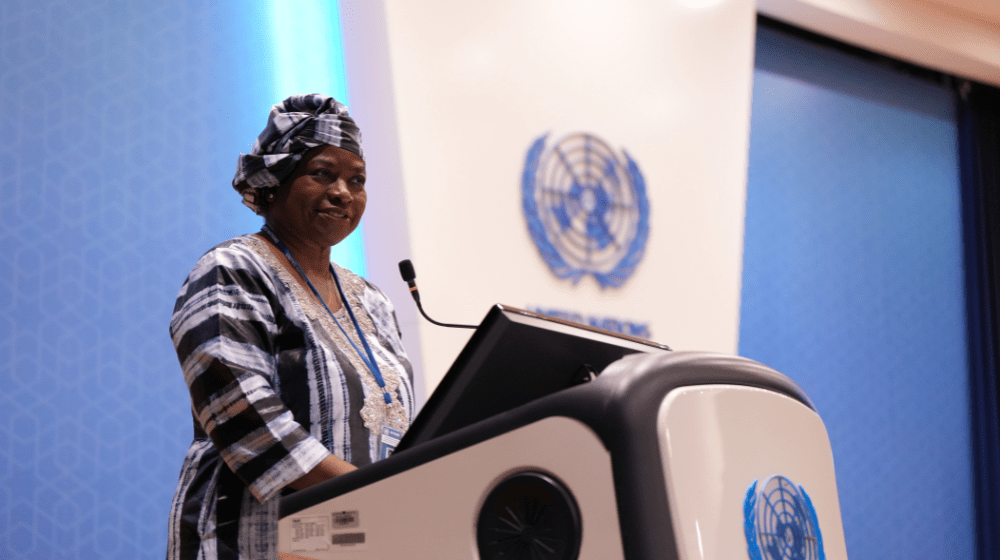Beirut, 13 September 2023 - To take stock of achievements and offer recommendations on means for placing population issues at the heart of sustainable development, the UN Economic and Social Commission for Western (ESCWA), the UN Population Fund Arab States Regional Office (UNFPA ASRO), the League of Arab States (LAS) and the International Planned Parenthood Federation (IPPF) kicked off today at the UN House in Beirut the Sixth Regional Review of the ICPD in the Arab Region 30 years after the International Conference on Population and Development (ICPD30) and 10 years after the Cairo Declaration 2013.
The Conference is attended by ministers, parliamentarians and high-level officials from the Arab region, representatives from UN agencies, funds and programmes, international and regional organizations, national human rights institutions, civil society organizations, youth and other stakeholders.
In his remarks, the Minister of Social Affairs in Lebanon, Hector Hajjar, warned: “The lack of plans and strategies that ensure social stability affects vulnerable people and wastes their chance to enjoy a decent life.” Hajjar also reiterated Lebanon's commitment to the Programme of Action (PoA) of the ICPD given its key role in providing social stability.
Integrating population dynamics and projections in policymaking processes has become a prerequisite to achieve sustainable development in the Arab region, whose population is expected to grow to 694 million by 2050.
In 1994, 179 states adopted the PoA of the ICPD, which addressed the specific needs of different population groups and the challenges they face in the context of demographic transitions, environmental changes and emerging social and economic developments. A review of progress made in implementing the PoA is conducted every five years.
ESCWA Executive Secretary, Rola Dashti, highlighted the need for an enabling environment for young people, women, ageing people, persons with disabilities, and migrants and refugees to develop their societies and contribute to achieving the Sustainable Development Goals (SDGs). “We need to build resilient societies and strong economies that keep up with today’s requirements and adapt to the impacts of climate change, so as to leave no one behind. Such a goal requires cooperation among all stakeholders,” she stressed.
Despite the polycrisis facing the Arab region, progress on inclusion of women and girls in development processes has been sustained in some countries.
UNFPA Executive Director, Dr. Natalia Kanem, said: “Investing in women’s and girls’ health, education, rights and agency lays the foundation for gender equality, drives progress within communities and catalyzes prosperity in the Arab region.” She emphasized the necessity to invest in policy actions that seek to create an enabling environment for them to make informed decisions about their body and life across development, peacebuilding and humanitarian settings.
In her intervention, Assistant Secretary-General and Head of the Social Affairs Sector at the League of Arab States, Haifa Abou Ghazaleh, emphasized that managing the relationship between population and development is necessary for achieving a dynamic balance that would improve the quality of human life. “This requires creating synergies between population goals, and economic, social, cultural, environmental and legislative ones in future plans and programmes,” she continued.
For her part, IPPF – Arab World Region Director, Fadoua Bakhadda, underlined the need for cooperation in the provision of universal access to sexual and reproductive health services, and the eradication of gender-based violence, so as to leave no one behind in the pursuit of sustainable development. “As sexual and reproductive health rights defenders, we are extending the global ICPD commitments, calling for international and national actors to enhance the accountability and sustainability of actions,” she added.
Although previous ICPD reviews from the region had revealed progress, it remains unequal among Arab countries due to multiple crises and emerging megatrends.
10 years ago, the Arab states reaffirmed their support for the PoA by adopting the 2013 Cairo Declaration, thus endorsing dignity and equality, health, environmental sustainability and governance as top priorities for the region. Today, the ICPD30 provides an opportunity to envision the future through working together with urgency and seizing every opportunity to achieve the SDGs by 2030 and beyond.
###
About UNFPA
UNFPA is the United Nations sexual and reproductive health agency. Our mission is to deliver a world where every pregnancy is wanted, every childbirth is safe and every young person's potential is fulfilled. We promote gender equality and empower women, girls and young people to take control of their bodies and their futures. We work with partners in more than 150 countries to provide access to a wide range of sexual and reproductive health services. Our goal is ending unmet need for family planning, preventable maternal death, and gender-based violence and harmful practices including child marriage and female genital mutilation by 2030.
About ESCWA
One of five United Nations regional commissions, ESCWA supports inclusive and sustainable economic and social development in Arab States, and works on enhancing regional integration.
For more information:
UNFPA ASRO
- Samir Aldarabi, +20 106 8484879, email: aldarabi@unfpa.org
ESCWA
- Ms. Maryam Sleiman, +961-81-769-888; email: sleiman2@un.org
- Ms. Rania Harb, +961-70-008-879; email: harb1@un.org


